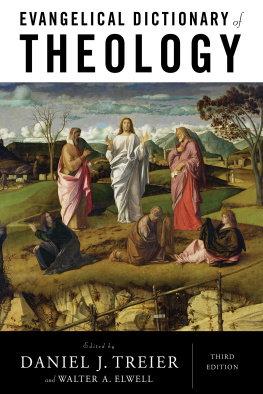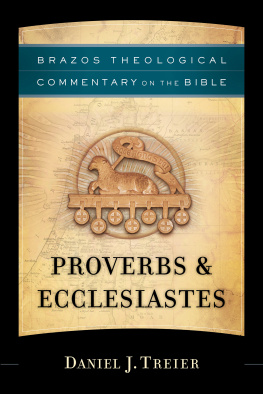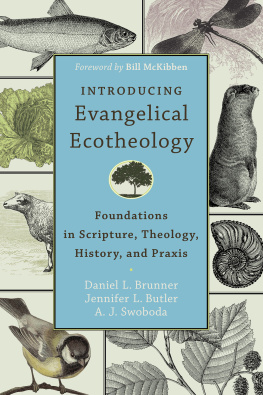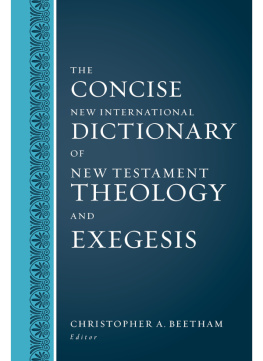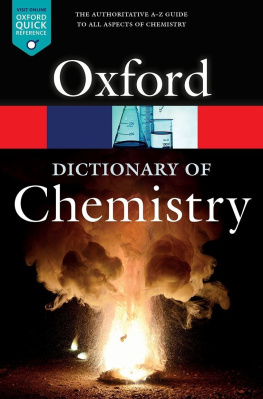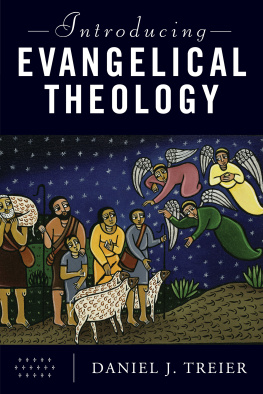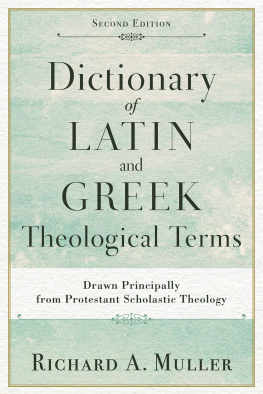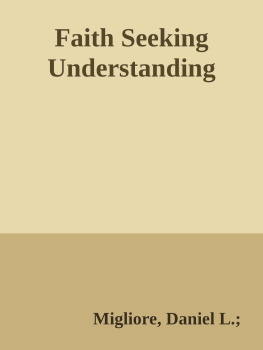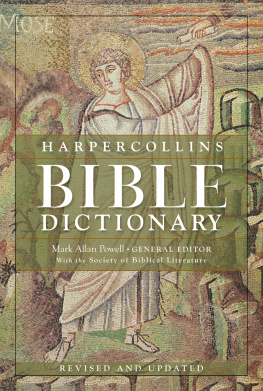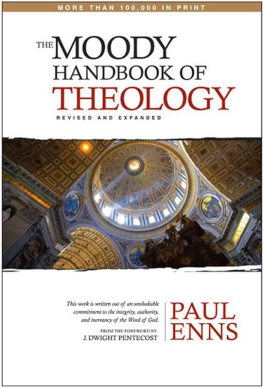Daniel J. Treier - Evangelical Dictionary of Theology
Here you can read online Daniel J. Treier - Evangelical Dictionary of Theology full text of the book (entire story) in english for free. Download pdf and epub, get meaning, cover and reviews about this ebook. year: 2017, publisher: Baker Publishing Group, genre: Religion. Description of the work, (preface) as well as reviews are available. Best literature library LitArk.com created for fans of good reading and offers a wide selection of genres:
Romance novel
Science fiction
Adventure
Detective
Science
History
Home and family
Prose
Art
Politics
Computer
Non-fiction
Religion
Business
Children
Humor
Choose a favorite category and find really read worthwhile books. Enjoy immersion in the world of imagination, feel the emotions of the characters or learn something new for yourself, make an fascinating discovery.
- Book:Evangelical Dictionary of Theology
- Author:
- Publisher:Baker Publishing Group
- Genre:
- Year:2017
- Rating:3 / 5
- Favourites:Add to favourites
- Your mark:
- 60
- 1
- 2
- 3
- 4
- 5
Evangelical Dictionary of Theology: summary, description and annotation
We offer to read an annotation, description, summary or preface (depends on what the author of the book "Evangelical Dictionary of Theology" wrote himself). If you haven't found the necessary information about the book — write in the comments, we will try to find it.
Evangelical Dictionary of Theology — read online for free the complete book (whole text) full work
Below is the text of the book, divided by pages. System saving the place of the last page read, allows you to conveniently read the book "Evangelical Dictionary of Theology" online for free, without having to search again every time where you left off. Put a bookmark, and you can go to the page where you finished reading at any time.
Font size:
Interval:
Bookmark:
Evangelical Dictionary of Theology , 3rd edition
General Editors: Daniel J. Treier and Walter A. Elwell
Advisory Editors: D. Jeffrey Bingham, Cheryl Bridges Johns, John G. Stackhouse Jr., Tite Tinou, and Kevin J. Vanhoozer
1984, 2001, 2017 by Baker Publishing Group
Published by Baker Academic
a division of Baker Publishing Group
P.O. Box 6287, Grand Rapids, MI 49516-6287
www.bakeracademic.com
Ebook edition created 2017
Ebook corrections 04.29.2019
All rights reserved. No part of this publication may be reproduced, stored in a retrieval system, or transmitted in any form or by any meansfor example, electronic, photocopy, recordingwithout the prior written permission of the publisher. The only exception is brief quotations in printed reviews.
Library of Congress Cataloging-in-Publication Data is on file at the Library of Congress, Washington, DC.
ISBN 978-1-4934-1077-4
Unless otherwise labeled, Scripture quotations are from the Holy Bible, New International Version. NIV. Copyright 1973, 1978, 1984, 2011 by Biblica, Inc. Used by permission of Zondervan. All rights reserved worldwide. www.zondervan.com. The NIV and New International Version are trademarks registered in the United States Patent and Trademark Office by Biblica, Inc.
Contents
Dictionary Entries AZ
PREFACE TO THE THIRD EDITION
In 1984, when Walter Elwell dramatically revised and expanded the former Baker Dictionary of Theology into the Evangelical Dictionary of Theology , he did not have the luxury of using computerized word processing or spreadsheets. He relied on postcards and a basement worktable. I treasure a 1983 photo he has shared, in which he stands next to the typescript as it was ready for delivery to the publisherregistering, on a tape measure, over five feet tall! The resulting legacy of the EDT is long and distinctive, particularly in its readability and its global reach, for instance into Eastern Europe.
Nevertheless, revision inevitably becomes essential, and I am grateful for Dr. Elwells blessing to take up this responsibility. The basic editorial perspective remains the same: attempting to represent both the range of evangelical diversity accurately and the center of evangelical consensus winsomely, while making evangelical engagement with wider scholarship accessible. The chief components of this revision include the following.
1. We have reduced the volumes overall size by nearly 30 percent to strengthen its focus on theology per se, taking advantage of the fact that some secondary material is now readily and more deeply accessible elsewhere. Accordingly, the volume has become more focused on systematic theology; some secondary articles in biblical and historical theology have been reduced or removed, while some remaining articles have been trimmed. This reduction in size also meant returning to an earlier practice, containing no articles on living theologians. Aside from worries over changing views and speedy obsolescence, the sheer volume of relevant voices supported this decision. Some of the most significant figures can still be covered under the headings of related movements they helped to spawn.
2. We have added one hundred and fifty thousand words of new content while making special effort to diversify the contributor list. Some of this fresh material involves brand-new articles on subjects of contemporary theological interest. Yet we have also replaced a wide range of earlier articles, especially larger treatments of major doctrinal loci and articles on early Christianity. Almost half of the new authors contribute female, ethnic minority, and/or Majority World perspectives, improving our representation of evangelical Christianitys fullness.
3. We have streamlined the prose as needed while updating every remaining article in light of recent scholarly developments. The dictionarys distinctive focus on readable overviews frequently does not require intricate revisions to address fresh academic subtleties. Nevertheless, many remaining articles contain modest changes, especially near their conclusions, updating scholarly and/or recent evangelical trends. Because many earlier contributors are now deceased, we have kept the basic viewpoints of articles the same or else we have replaced them. When occasionally an update exceeds a parenthetical note or turn of phrase, it is usually signaled by language such as Recently... , and when possible it appears toward the end of an article. Of course, the original authors exact words are readily accessible in the previous edition if needed.
4. Finally, all bibliographies have been updated. Although technical works are often included, our chief focus is on works that offer next steps for basic learning. Typically we have not repeated references to works that are mentioned in the articles themselves. Often we still include some of the more classic works that originally informed earlier articles; we have not indulged the conceit that newer and more academic works are always superior. Yet we have sought to indicate at least the most substantial, accessible, contemporary treatments.
One other word is in order regarding both the bibliographies and the articles themselves. We have taken the task of cross-referencing very seriously. Linking articles in this way allows us to expand the array of evangelical perspectives on contested subjects by assigning authors from various perspectives to related articles. Similarly, a fuller range of resources for further reading can often be gained by checking the bibliographies of cross-referenced articles.
In contrast with Dr. Elwells herculean efforts, I was able to employ technological crutches, such as a spreadsheet containing well over two thousand entries. Moreover, I depended on help from numerous people. Baker Academic made generous provisions for research assistance, and it was a delight to work with my friends Jim Kinney and Brian Bolger once again. Steve Spencer helped with bibliography revision, especially on more obscure articles, while providing some technical corrections. Katherine Graber served as my indispensable assistant for most of the projecthandling correspondence, tracking articles, keying in revisions, and so forth. Timothy Belcher, Stephanie Lowery, and Hank Voss also provided initial help. Advisory board members representing a cross-section of evangelical theologies and disciplinary specialtiesJeffrey Bingham, Cheryl Bridges Johns, John Stackhouse Jr., Tite Tinou, Kevin Vanhoozergave important feedback at a long early planning meeting along with support in periodic emails ever since.
A sabbatical from Wheaton College made it possible to finish the project. Jeff Greenman and Tim Larsen particularly recognized the importance of this endeavor and gave much-needed encouragement. My wife, Amy, my daughter, Anna, and our parents listened patiently and prayerfully for six years to updates regarding the dictionary, and they lovingly rescued me from occasional despair.
As Walter wrote in prior prefaces, we offer this edition of the EDT with the grateful prayer that God will use it not only to inform you intellectually but also to form you spiritually. Furthermore, this edition embodies the hopeful conviction that authentically evangelical theology is important for the health of Christs churchnow more than ever.
Daniel J. Treier Wheaton College
PREFACE TO THE SECOND EDITION
The positive reception accorded the first edition of the EDT was a source of deep satisfaction and thanksgiving to God on the part of the many people who had contributed to it. The goal that Baker Book House had set was to construct a one-volume reference work on theology that was both up to date and academically accurate, yet accessible to the average layperson. The success that the EDT enjoyed was testimony that that goal had largely been reached. However, no work of this sort is entirely free of shortcomings and certain limitations, some of which were unavoidable, but some of which were due to human oversight. Our reviewers were good enough to point some of these out to us and some of them we found on our ownand some we were able to correct during the various printings of the original edition. However, in time we came to realize that a full-blown revision would eventually be called for, and work on that began about six years ago. The process of revision has been every bit as demanding as the production of the original volume and, I might add, every bit as informative and enjoyable. Obviously, it is the authors who deserve the lions share of the credit for the excellence of the work that was done, and I gladly offer them my sincerest thanks. This is not to overlook the immense amount of effort that everyone at Baker put into this revision. Special thanks go to Rebecca Cooper, David Aiken, Brian Brunsting, Barb Malda, Jan Arroyo, Helen Kelly, Laura Weller, Margie Hailstone, Jarl Waggoner, and Matt Donnelly, along with Allan Fisher, Jim Weaver, and Cindy Ingrum.
Next pageFont size:
Interval:
Bookmark:
Similar books «Evangelical Dictionary of Theology»
Look at similar books to Evangelical Dictionary of Theology. We have selected literature similar in name and meaning in the hope of providing readers with more options to find new, interesting, not yet read works.
Discussion, reviews of the book Evangelical Dictionary of Theology and just readers' own opinions. Leave your comments, write what you think about the work, its meaning or the main characters. Specify what exactly you liked and what you didn't like, and why you think so.

